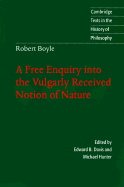Book contents
- Frontmatter
- Contents
- Acknowledgements
- List of abbreviations
- Introduction
- Chronology
- Further reading
- A note on the text
- A Free Enquiry into the Vulgarly Received Notion of Nature
- The Preface
- Section I
- Section II
- Section III
- Section IV
- Section V
- Section VI
- Section VII
- Section VIII
- Glossary
- Index
- Cambridge Texts in the History of Philosophy
Introduction
Published online by Cambridge University Press: 05 June 2012
- Frontmatter
- Contents
- Acknowledgements
- List of abbreviations
- Introduction
- Chronology
- Further reading
- A note on the text
- A Free Enquiry into the Vulgarly Received Notion of Nature
- The Preface
- Section I
- Section II
- Section III
- Section IV
- Section V
- Section VI
- Section VII
- Section VIII
- Glossary
- Index
- Cambridge Texts in the History of Philosophy
Summary
The scientific revolution of the seventeenth century was a turning point in Western thought. It is largely to this era that we owe the ethos of modern science – empirical, cumulative and deeply quantitative in its methods; iconoclastic in its view of previous intellectual traditions; and assertive of its ability not only to understand nature but also to control it. Perhaps most fundamental, however, was the adoption at this time of a new world view, involving a complete change in the way in which nature was conceived. By reviving and adapting the ancient atomist conception of nature, the mechanical philosophers of the seventeenth century challenged prevailing Aristotelian and Galenic notions, which typically depicted nature as a wise and benevolent being. Associated with such views were phrases like ‘Nature does nothing in vain’, ‘Nature abhors a vacuum’ or ‘Nature is the wisest physician’. By contrast, thinkers such as René Descartes (1596–1650), Pierre Gassendi (1592–1655) and Robert Boyle (1627–91) held that the world was a vast, impersonal machine, incapable of acting consciously.
Theological issues were intimately and inextricably involved in this conceptual shift in ways that have only recently been fully appreciated. Traditionally, it was presumed that the acceptance of mechanical explanations eroded belief in divine providence and drove a wedge between theology and science.
- Type
- Chapter
- Information
- Publisher: Cambridge University PressPrint publication year: 1996



